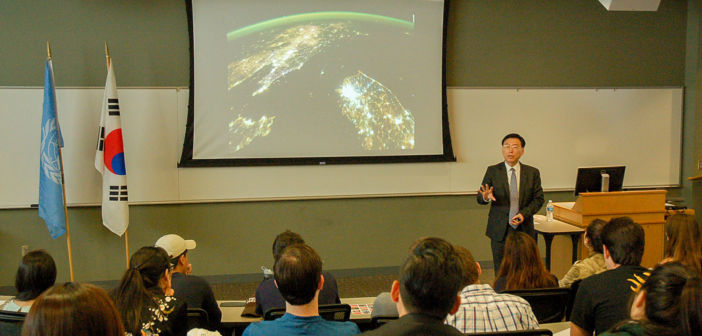Choong-hee Hahn sat down with The Brown and White for a brief question and answer session, which can be found here.
Amid growing tensions between the United States and North Korea, Choong-hee Hahn, the South Korean ambassador to the United Nations, addressed the Lehigh community Tuesday evening in STEPS. When sharing his thoughts about South Korea’s northern neighbors, Hahn did not hold back.
“North Korea is trying to lie and cheat the United States and the international community,” Hahn said.
Hahn said since a joint statement between the United States and North Korea in 1993, there have been five different agreements between the two nations. On certain occasions, other nations have had to become involved regarding North Korea’s nuclear program. Every time, Hahn said, North Korea has ignored the statements and acted in its own interest.
This kind of defection is a common tactic for the Democratic People’s Republic of Korea. Hahn said North Korea’s practice of participating in talks simply to ask for compensation and then turning its back on the agreements afterward has become the norm.
“They have cheated many, many times,” Hahn said. “Enough is enough.”
Hahn said the continuation of strong sanctions from the United Nations is vitally important to keep North Korea in line, calling it “the only justifiable way” to inflict pressure on North Korea with the hope it can change its course. The sanctions placed on North Korea last year were the harshest in United Nations’ history.
Hahn said he is critical of North Korea’s reliance on military technologies. He said the country focuses too much on military capabilities and not enough on its own people.
He said he also criticized North Korea’s use of false aggression from the United States to give its people a sense of urgency and nationalism that is then used to consolidate power within the central government.
“There is no hostile policy of the United States toward North Korea,” Hahn said.
Hahn said the aggression fabricated by the North Korean government is not reciprocated in the United States, and there is no reason for the United States to use a preemptive strike.
“North Korea has no reason to attack the United States,” Hahn said. “It would be a suicidal strike.”
Hahn said unified Korean voices and increased international cooperation would be necessary to address the divide between North and South Korea. He said the majority of people living in the Korean peninsula want to unify and cooperate with North Korea.
Hahn said negotiating between North and South Korea would be the best option for resolution, but he acknowledged it can be difficult when both countries have such different governmental systems. Additionally, North Korea refuses to talk about nuclear disarmament with its neighbors to the south, he said.
Hahn said working with the international community, debunking North Korean propaganda myths and reintegration will be important in reuniting the Korean peninsula — but the nuclear issue will have to be resolved first.
Nick Razewski, ’19, an international relations major, said he was surprised by Hahn’s calm demeanor while talking about the conflict. He said he thought North Korea always posed a threat, but Hahn spoke about how war was unlikely.
Razewski was surprised to hear Hahn wants to ensure North Korea doesn’t consider South Korea the enemy.
“I thought that was super interesting and different from a lot of other things that I’ve heard before,” Razewski said.
China’s interest in the conflict comes from its concerns of continuing stability and not losing geopolitical power in the region. Hahn said China stopping North Korea’s supply of oil would be “a game changer.”
When asked how to avoid defection in the stand-off between North Korea and the United States, Hahn said a strong position by the United States is vital in negotiations. He said he doesn’t think the United States should stick with Barack Obama’s policy of strategic patience.
“He went a lot more in depth about the potential solutions for it rather than just journalists I’ve been reading because obviously he knows a lot more about the situation in South Korea and North Korea,” Razewski said. “It was a pretty cool opportunity to hear from someone from there, especially at a time like this.”
Hahn was sponsored to speak at Lehigh through the university’s partnership with the United Nations, the Lehigh Korean Association and the international relations department.






Comment policy
Comments posted to The Brown and White website are reviewed by a moderator before being approved. Incendiary speech or harassing language, including comments targeted at individuals, may be deemed unacceptable and not published. Spam and other soliciting will also be declined.
The Brown and White also reserves the right to not publish entirely anonymous comments.
1 Comment
Pingback: South Korean UN ambassador addresses U.S. tensions with North Korea – Matthew Cossel